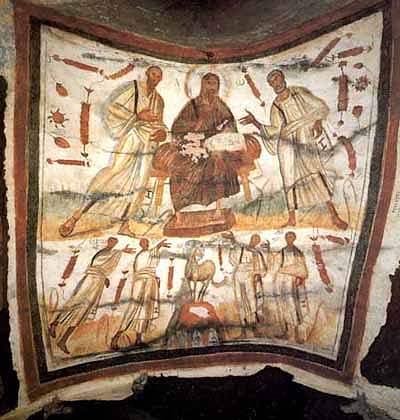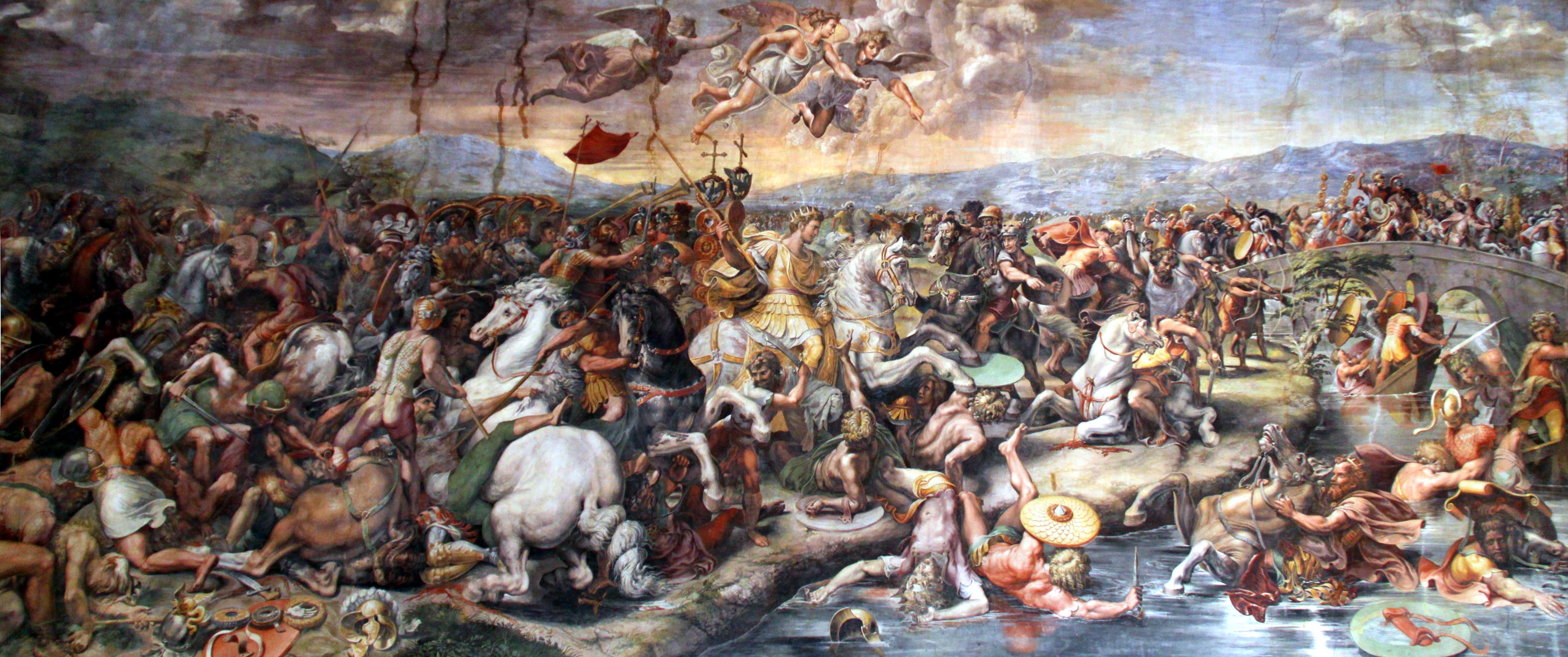Intro | Part I | Part II | Part III | Part IV | Part V a |Appendix
“And now, all rising at the signal which indicated the emperor’s entrance, at last he himself proceeded through the midst of the assembly, like some heavenly messenger of God, clothed in raiment which glittered as it were with rays of light, reflecting the glowing radiance of a purple robe, and adorned with the brilliant splendour of gold and precious stones. Such was the external appearance of his person; and with regard to his mind, it was evident that he was distinguished by piety and godly fear.” – EusebiusThe largest gathering of Church leaders ever assembled at that point of time met on 20th of May 325 within the Imperial palace in Nicaea. Over 200 bishops and prelates from across the Roman Empire and the known world had come to Nicaea at the summons of the Roman Emperor Constantine. Although the church had been free from persecution for 12 years, the wounds of the past were still fresh in living memory. This was poignantly brought to mind when Constantine kissed the mutilated eye bishop Paphnutius of Thebes had lost during the last batch of persecutions. Here was the scion of the throne of Augustus, Nero and Diocletian, resplendent in purple and gold, embracing a former enemy of the Empire. The power of Rome was at the disposal of the church, and it remained to be seen how the body of Christ would respond.
It was that question which would shape much of the church’s story for the foreseeable future. Rome was not the first state to tolerate Christians. Nor was Rome the first state to officially accept Christianity as the state religion (which Rome did under the Emperor Theodosius in 391). But this was Rome. And the question of the church and state’s relationship was never far from surface in the theological tensions that punctuated the fourth century.
One of the immediate responses to “Constantine’s Settlement” was a withdrawal from civil society. The monastic movement had been a growing phenomenon since St Anthony first ventured alone into the wilderness in 270. The monastic movement continued to grow in Egypt and Syria after Constantine’s consolation of power. It has been suggested that this growth had something to do with a growing discontent with the world. The blurring of the church and the world would lead some to maintain their purity in the Libyan Desert. They sought to maintain the separate society of the church amidst a corrupt world. It was this desire which also lead another group out of society.
When persecution broke out in Carthage and North Africa in 303, there were many clergy – including bishops – who handed Bibles over to be burnt by the authorities. With the coming of tolerance in 313, these clerics – described as traditors or surrenders – and other priests ordained by them were readmitted to the church. This was perceived by some as being undisciplined and unorthodox. A group of Christians led by the presbyter Donatus refused to recognise the Episcopal authority of the traditor Caecilian in Carthage, and insisted that traditors needed to be rebaptised and re-ordained. After initially appealing to Constantine to settle the matter, Donatus and his supporters split from the church, organizing their own society and church hierarchy (a similar split had happened in the North African church in the third century: the Novatianist controversy) . With their alternative society, by 350 the Donatist church was the largest church in North Africa.
Besides withdrawing from society or creating distinct communities, the most common response to the new political situation was to openly embrace it. This can be seen in the many Arian officials who vied for the Emperors support between the councils of Nicaea in 325 and Constantinople in 381. But perhaps the most well known ecclesiastical supporter for the new political climate was Eusebius of Caesarea. Eusebius’ work gave later imperial propagandists their foundation for giving the Emperor a place in the cosmic divine order. For Eusebius the ascension of Constantine completed Christ’s victory over the Roman tutelary deities. His argument followed the line of many second century apologists; that it was no accident that the church arose at the time when the world had been united under one political power. But Eusebius’s thesis was novel. The political world had been united under Augustus, the spiritual world united under Christ, and Constantine had united both realms in his body. It is with such eschatological certainty that Eusebius writes of the Christian revolution:
“The ancient oracles of the prophets, delivered to us in the Scripture, declare this; the lives of pious men, who shone in old time with every virtue, bear witness to posterity of the same; and our own days prove it to be true, wherein Constantine, who alone of all that ever wielded the Roman power was the friend of God the Sovereign of all, has appeared to all mankind so clear an example of a godly life.”Constantine’s victory was God’s victory. But had the Parousia come in this Christian Emperor? It was not until the end of the fourth century that an alternative vision began to emerge. It was by-and-large Ambrose of Milan alone who articulated this vision (in the late fourth century Milan was arguably the most important city in Italy). Whilst “Constantine’s settlement” was seen to be a victory over the evil powers – Rome had come to obey Christ – this was not the eschaton.
For Ambrose, Constantine and his successors might be Christians, but as earthly authorities they belonged to the old order of things. They would one day have to throw their crowns before Christ. Within the emerging movement we now know as Christendom, the task of the church was to remind the government of this. The rulers and authorities would have to one day give account of themselves before the Lord, and they were expected in the meantime to behave as a Christian (O’Donovan, 1996, p 199). And within the emerging Christian society, the church needed to remind itself that it was a separate polity, whose allegiance belonged first and foremost to the resurrected Jesus Christ. It was for this reason that Ambrose refused in 385 and 386 the request of the Emperor Valentinian II to make church buildings available for Arian worship. Ambrose refused to discuss the matter in the imperial palace, arguing that “Matters of faith should be handled in the church before the people.” The laity gathered with their bishop inside the church building, proved their identity as the Christian society. The church building took on a status akin to a modern embassy (O’Donovan, 1996, p 200).
In 390 Ambrose refused to admit Theodosius to communion for several months until he had done penance for the actions of his troops in massacring 7000 people in Thessalonica. Ambrose, who was neither ordained nor baptised when he was selected bishop, was able to require that the Emperor act like a Christian. His theology of church and state would be given further intellectual credence in the fifth century by his pupil Augustine of Hippo.
__________________________
The fourth century witnessed a revolution. It was a revolution won not through strength of arms, but through the obedience of faith as Rome bowed her knee to Christ. It was the beginning of a social, political and religious transformation that grew from the ground up. Contrary to some opinion, Christianity was not imposed from above; when the Emperor Julian attempted to dissolve “Constantine’s Settlement” in 361-363 and restore paganism within the Empire, he failed due to the entrenched nature of Christianity. He complained that:
“These impious Galileans not only feed their own poor, but ours also; welcoming them into their agape, they attract them, as children are attracted, with cakes.”The fourth century begins the period known as Christendom, that cultural and political era that would last for 1500 years. It has in recent times been remarked that this period more so than any other did great damage to the progress of the gospel. There certainly was a temptation within the fourth century, as O’Donovan has noted, “to see the conversion of the rulers as achieved and complete, and to abandon mission.” But that would be to misunderstand Christendom. “Far from seeing Christendom...as an age in which the missionary challenge of the church became derailed, we have to understand that it was perpetually preoccupied with that challenge” (O’Donovan, 1996, p 197). For 300 years Christianity had sought the transformation of society, as individuals came to Christ. It should be expected than that after such widespread social change, that there would be political transformation too. With the population turning to Christ, it would be expected that their political leaders would seek to govern in such a way so as to confirm with the gospel. But this was never the goal of mission. Political transformation followed social transformation. Across the following centuries the church would struggle with knowing which response – Donatist, Eusebian or Ambrosian – to follow. The challenge was to remember that the new political situation was not the end of Christian mission.
Further Reading:
Oliver O'Donovan, The Desire of the Nations, CUP 1996.















